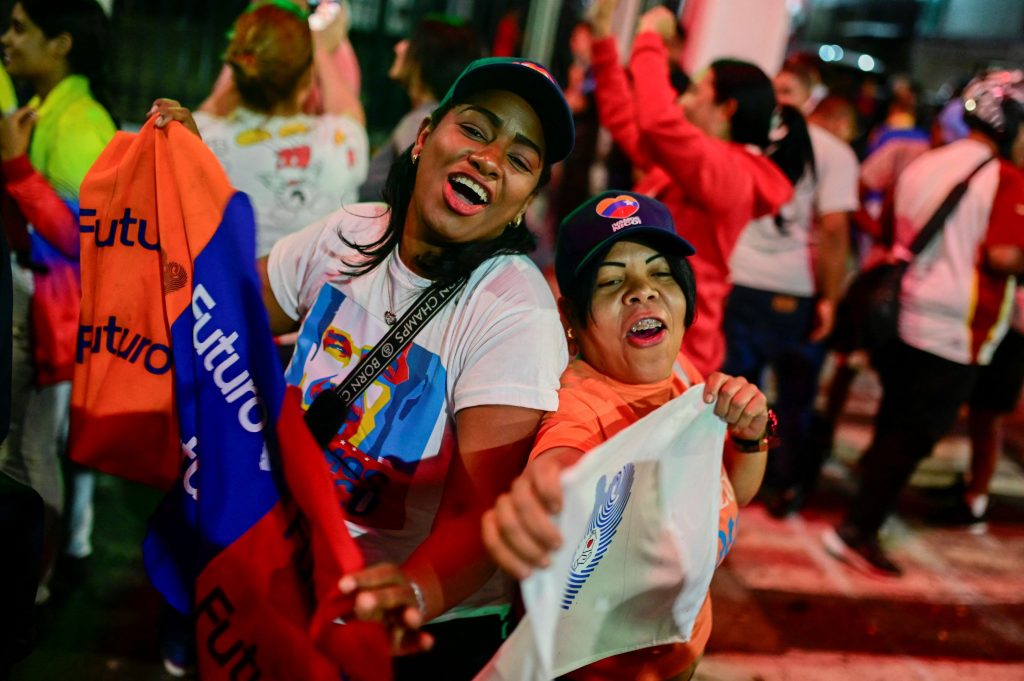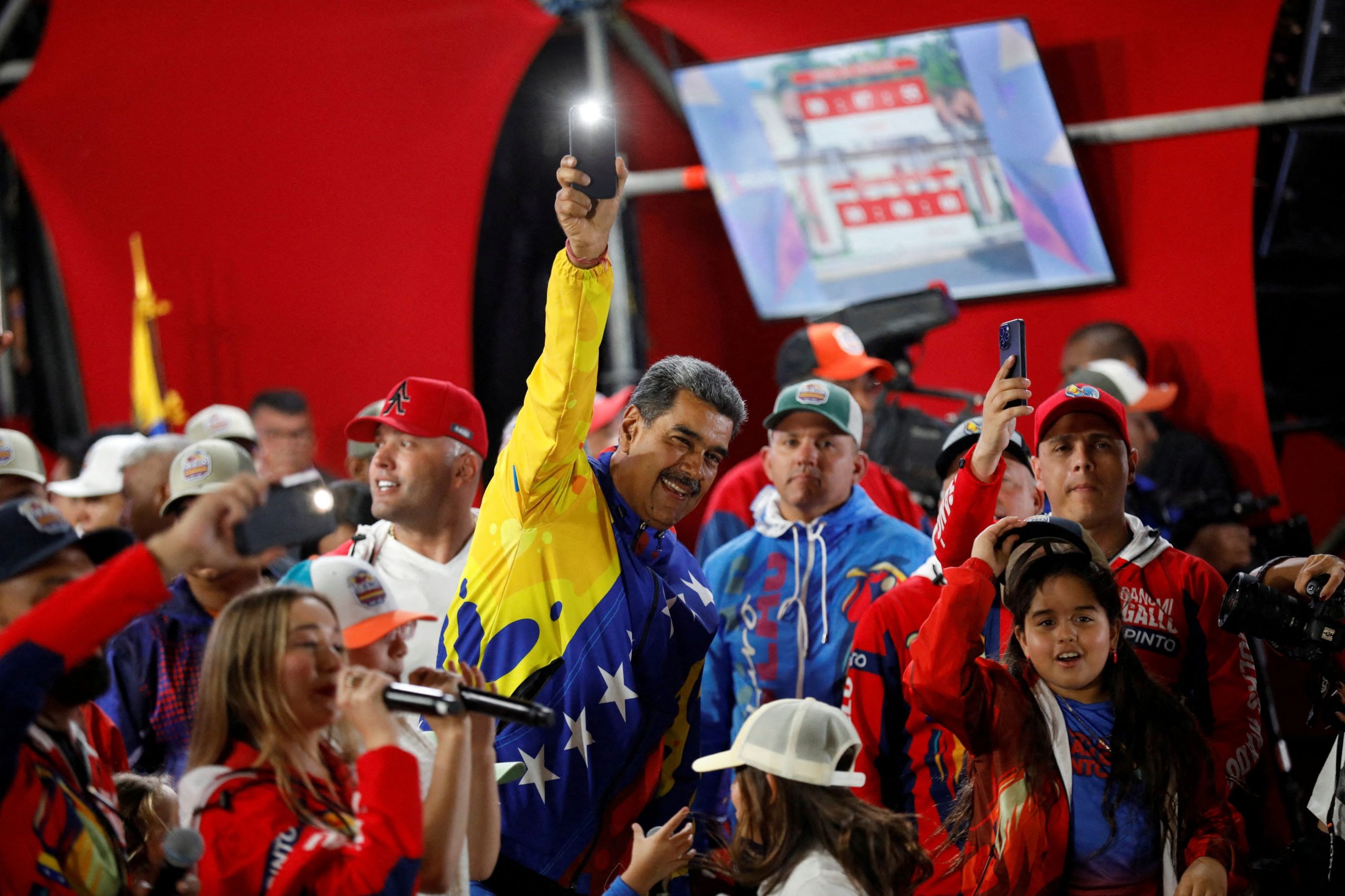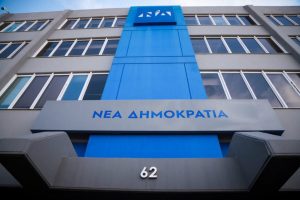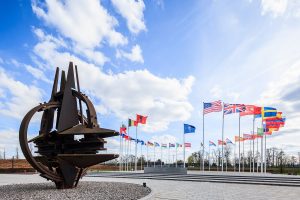CARACAS, Venezuela—Strongman Nicolás Maduro claimed an unlikely victory in Venezuela’s presidential election Sunday, securing a third six-year term in a result that opposition leaders contested, saying the regime had likely falsified the vote count.
Just after midnight Monday, six hours after polling stations were supposed to close, the regime-controlled National Electoral Council said that the 61-year-old leader would extend his 11-year rule into the next decade after garnering 5.1 million ballots, taking 51.2% of the vote, to 4.4 million, or 44.2% of the vote, for his opponent Edmundo González . The result of the election came after Maduro had trailed González for weeks by more than 25 percentage points in the polls.
Almost immediately, residents around Caracas began banging on pots to protest the result, which was expected to be contested by the opposition with the help of its allies, including the U.S. At the same time, Maduro loyalists gathered outside the Miraflores presidential palace to celebrate the win with a concert.
“What a beautiful day we’ve lived,” Maduro told the crowd from a stage where he also danced to reggaeton music. “Thanks for giving me this victory that the people so deserve. This is the triumph of the ideals of equality.”
Maduro’s continued hold on power in oil-rich Venezuela is likely to make it harder for the U.S. and its allies to resume normal diplomatic relations and fully lift sanctions leveled against the regime for human-rights abuses and corruption. That could prolong an economic crisis that has led to the exodus of nearly eight million people during Maduro’s rule, with many settling in the U.S. and other Latin American countries.
The result is also a blow to the Biden administration, which had offered concessions in recent months in exchange for commitments to hold free elections, but instead saw Maduro tighten his grip. Maduro’s victory will be welcomed in the capitals of the U.S.’s most vehement adversaries, from Havana to Moscow to Tehran, whose autocratic leaders have built close commercial and military ties with Venezuela.

Supporters of Venezuela’s President Nicolas Maduro celebrate the results after the presidential election in Caracas, Venezuela July 29, 2024. REUTERS/Maxwell Briceno
Maduro, who rose from bus driver and trade union delegate to foreign minister before becoming the handpicked heir to Hugo Chávez , has governed a country in steep decline. The economy contracted 80% before a recent uptick and the U.S. leveled sanctions that helped further hobble the country’s oil industry . The U.S. has also sanctioned or indicted Maduro and other regime officials for crimes ranging from drug trafficking to corruption and human-rights abuses.
The regime’s announcement was quickly denounced by both the opposition and its allies, including the U.S.
Speaking from Japan, U.S. Secretary of State Antony Blinken said the Biden administration had “serious concerns that the result announced does not reflect the will or the votes of the Venezuelan people.”
He said “the international community is watching this closely and will respond accordingly.”
Speaking early Monday, the opposition leader Maria Corina Machado , who backed González after she had been banned from running against Maduro, said he had taken about 70% of the votes. Machado called Maduro’s claim of victory fraudulent and urged the armed forces to respect the election’s real results.
“We are going to defend the truth,” said Machado. “Everyone knows what happened. They know what happened and what they are trying to do.”
Independent polling firms had given Venezuelans reasons for hope, even though González is a bookish, 74-year-old former diplomat with few political ambitions. Both Delphos and ClearPath Strategies had him beating Maduro by more than 25 percentage points ahead of the vote.
Exit polls as the voting neared an end Sunday afternoon showed that González had won by a large margin. Edison Research and Gallup-Ipsos had González more than doubling Maduro’s vote count. The opposition also has access to a quick count—an actual tabulation of large samples from voting stations and considered highly accurate—that gave González nearly 8.5 million votes, 4.5 million more votes than Maduro.
But the announcement that Maduro had won was a blow to the opposition. Many thought fraud was likely. “We can’t keep living like this,” said Gioconda Zuzolo , 58, a retired teacher who voted at a school in downtown Caracas as people ate from trash strewn on a street corner.
Marilyn Salas , 45, a physical therapist, said she would now try to leave the country next year to join her cousin in the U.S. “All we ever wanted is change,” she said, “just to get this country back on track.”
With the outcome, Maduro appears to have further consolidated his hold on power. The president has survived oil sanctions leveled by the Trump administration in 2019, a range of small-scale military uprisings, including an assassination attempt involving a drone , and indictments. The U.S. State Department has offered a $15 million reward for information leading to his arrest.
Ahead of the vote, the opposition had been concerned about transparency at the electoral board. The government withdrew an invitation for the European Union to observe the election, instead leaving the onus on a small technical team from the Atlanta-based Carter Center and 90,000 opposition volunteers to monitor and report vote tampering.
Such work is vital in Venezuela, where the Maduro regime has been accused of rigging elections in recent years, including a 2017 election for congress in which the electronic voting machine operator denounced that more than a million votes were manipulated. Maduro’s re-election in 2018 was also marred by widespread fraud, the U.S. and other countries said.
On Sunday, some opposition activists said election authorities hadn’t provided their campaign workers with physical copies of the voter tally sheets that are vital for allowing the opposition to uphold the results. Opposition campaign workers, worried that the tallies amassed for each voting table would be taken away, posted receipts on social media showing González with a wide victory over Maduro.
“No one is moving until the votes from the tables are given to the CNE,” one worker said, referring to the electoral council.
He showed The Wall Street Journal how at three tables in a once-loyal government stronghold González received 906 votes to 574 for Maduro. The worker said he was worried the government would seize the paper receipts.
Omar Barboza , a senior opposition leader, said his teams had only been able to analyze 30% of the tally sheets by late Sunday because of government prohibitions. He called on authorities to respect the popular will. “Please, think about Venezuela and its future,” he said in a news conference.
In the weeks before Sunday’s vote, the regime arrested dozens of opposition campaign workers. To tamp down turnout, the government only permitted 69,000 of the nearly five million voting-age Venezuelans who left the country to cast a ballot from abroad.
“None of us can vote because of the restrictions,” Jose David Guerrero , a Venezuelan exile in Colombia. “I’m frustrated because I want to help my country.”
Maduro does have support in some corners of Venezuela, poor districts where the left-wing ideology of the president’s predecessor is firmly entrenched. And many Venezuelans have been relieved to see the economy make a slight rebound.
“I can’t go against Maduro because he’s the one who has given us stability, the peace that we can’t give up,” said Nestor Pérez , 69, outside of a voting center next to a government housing block. “Everything is going to get better. I’m not only supporting him because he gave me a home but also because of the stability in the country.”
Economists and local businessmen say that Maduro has gone against his anticapitalism rhetoric and permitted some de facto neoliberal reforms, including cuts in social spending, dismantling price controls and permitting the use of the U.S. dollar.
That helped the pull out of hyperinflation . The economy is projected to grow 4% this year after falling 80% in a decade.
Some American and Venezuelan businessmen who have privately discussed deals with the government say the regime is working on a transition toward a China or Vietnam-style governing model, where democratic and political rights are sacrificed in exchange for security and economic liberties.
On Monday, Maduro said he would convene a “grand national dialogue” between Venezuela’s political and economic sectors to look for ways to end the country’s political conflict and lure the foreign capital his nation sorely needs. In regular TV appearances, he markets himself as a pro-business leader and gatekeeper to Venezuela’s vast deposits of oil and minerals.
José Pérez , 47, a handyman, had liked what he had seen. “I voted for Maduro because what choice do we have?” he said. “Let’s give him another chance and see.”
Write to Kejal Vyas at kejal.vyas@wsj.com



